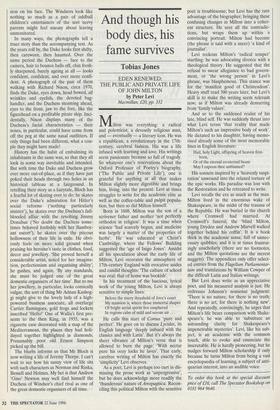And though his body dies, his fame survives
Tobias Jones
EDEN RENEWED: THE PUBLIC AND PRIVATE LIFE OF JOHN MILTON by Peter Levi Macmillan, £20, pp. 332 Milton was everything: a radical and polemicist, a devoutly religious man, and — eventually — a literary icon. He was a republican, a revolutionary in the 17th- century, cerebral fashion. His was a life infused with learning and love. His writings seem passionate because so full of tragedy. So whatever one's reservations about the Oxford Professor of Poetry's biography, (`The Public and Private Life'), one is grateful for anything at all that makes Milton slightly more digestible and brings him, living, into the present. Levi at times struggles to write for the academic elite as well as the coffee-table and pulpit popula- tion, but then so did Milton himself.
Born in 1608, Milton was the son of a scrivener father and mother 'not perfectly orthodox in religion'. It was a time when science 'had scarcely begun, and medicine was largely a matter of the properties of herbs'. He was educated at Christ's Cambridge, where the Fellows' Building suggested the 'age of Inigo Jones'. Amidst all his speculation about the early life of Milton, Levi recreates the atmosphere of 17th-century England with evocative asides and candid thoughts: 'The culture of school was oral; that of home was bookish'.
In his treatment of the luscious, lyrical work of the young Milton, Levi is always sensitive to simple lines:
Before the starry threshold of Jove's court My mansion is, where those immortal shapes Of bright aerial spirits live ensphered In regions calm of mild and serene air .. .
He calls this start of Comus 'pure and perfect'. He goes on to discuss Lycidas, its English language 'deeply imbued with the classics and with Latin'. But it's always the sheer vibrance of Milton's verse that is allowed to burn the page: 'With nectar pure his oozy locks he laves'. That early, carefree writing of Milton has exactly the `simplicity' Levi observes.
As a poet, Levi is perhaps too curt in dis- missing the prose work as 'unprogressive', but he does acknowledge more readily the `thunderous' nature of Areopagitica. Recon- ciling this political Milton with the sensitive poet is troublesome; but Levi has the rare advantage of the biographer, bringing these confusing changes in Milton into a coher- ent structure. He sees all the contradic- tions, but wraps them up within a convincing portrait. Milton had become (the phrase is said with a sneer) 'a kind of journalist'.
Levi reckons Milton's 'radical temper' startling: he was advocating divorce with a theological theory. He suggested that the refusal to swear allegiance to bad govern- ment, or 'the wrong person' in Levi's phrase, was blasphemous. This stance was for the 'manifest good of Christendom'. Heavy stuff read 300 years later, but Levi's skill is to make the writing seem relevant now; as if Milton was already demurring from 'family values'.
And so to the saddened realist of his late, blind self. He was suddenly thrust into what Levi terms `that reality that made Milton's such an impressive body of work'. He dictated to his daughter, having memo- rised already some of the most memorable lines in English literature:
Hail, holy Light, offspring of heaven first- born, Or of the eternal co-eternal beam May I express thee unblamed?
His sonnets inspired by a 'heavenly suspi- ration' unwound into the relaxed torture of the epic works. His paradise was lost with the Restoration and he retreated to write.
Levi recalls the era as much as the man. Milton lived in the enormous wake of Shakespeare, in the midst of the trauma of the Republic. He was buried in the church where Cromwell had married. At Cromwell's funeral, the 'blind Milton, young Dryden and Andrew Marvell walked together behind his coffin'. It is a book thick in the academic sense, full of unnec- essary quibbles; and it is at times frustrat- ingly unscholarly (there are no footnotes, and the Milton quotations are the merest nuggets). The appendices only offer select- ed entries from the Flagellum Parliamentar- ium and translations by William Cowper of the difficult Latin and Italian writings.
But Levi does write as an appreciative poet, and his measured analysis is just. He redresses Johnson's nonsense judgment: `There is no nature, for there is no truth; there is no art, for there is nothing new'. And repeatedly, convincingly, he urges that Milton's life bears comparison with Shake- speare's: he was able to 'substitute an astounding clarity for Shakespeare's impenetrable mysteries'. Levi, like his sub- ject, is an academic with the common touch, able to evoke and enunciate the inscrutable. He is hardly pioneering, but he nudges forward Milton scholarship if only because he turns Milton from being a vast encyclopaedia of learning, a subject of anti- quarian interest, into an audible voice.
To order this book at the special discount price of £16, call The Spectator Bookshop on 0181 964 9640.


























































 Previous page
Previous page